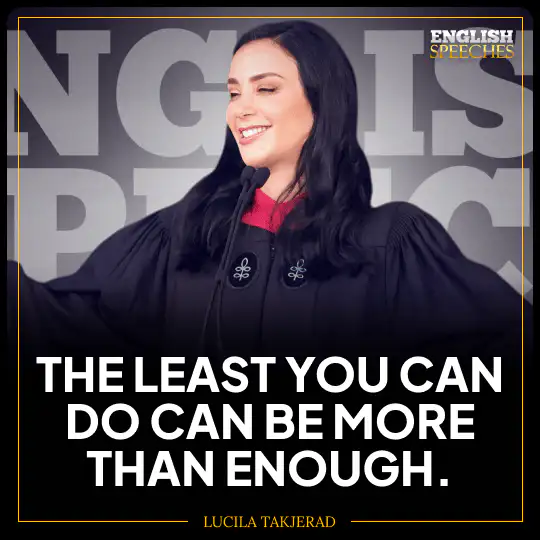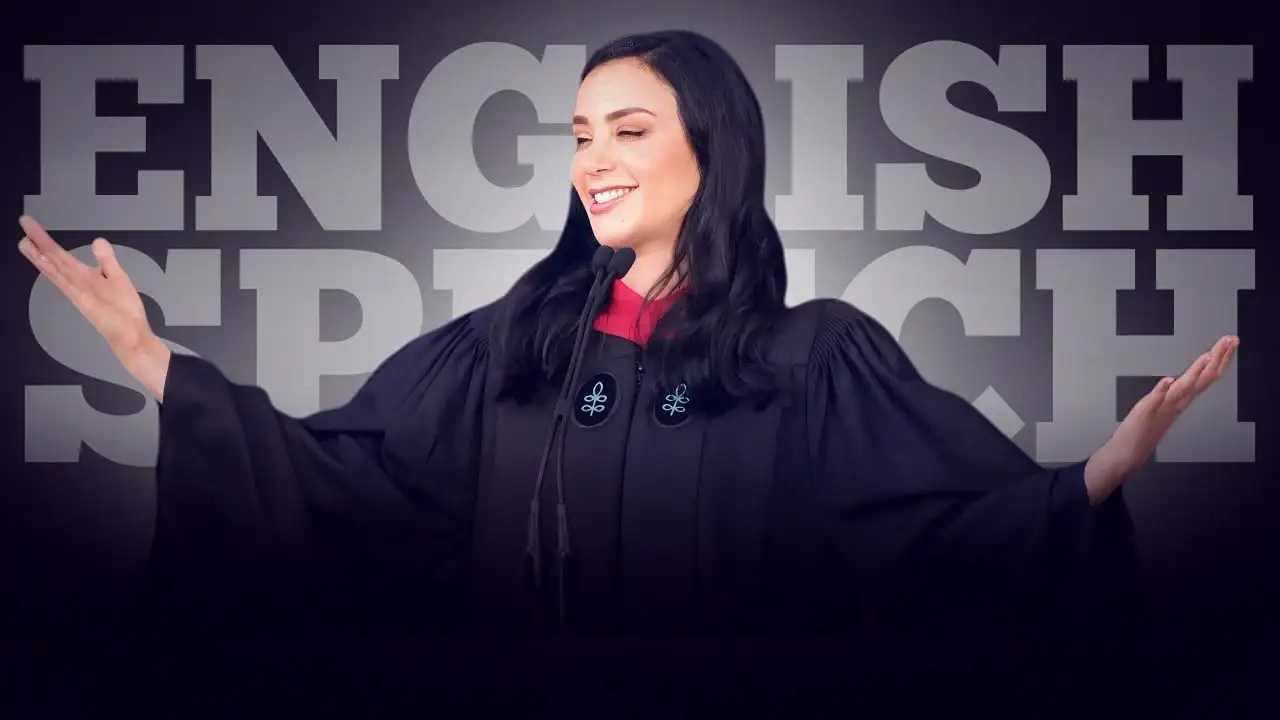Lucila Takjerad’s powerful speech at the Harvard 2019 Commencement encapsulates her incredible journey from a small Algerian village to one of the most prestigious universities in the world. Lucila recounts how a small act of kindness—a stranger signing her mother’s name on a list—changed the trajectory of her life. Her story is a heartfelt reminder of the profound impact of small gestures and the resilience required to overcome life’s challenges.
The Power of Small Gestures
Vocabulary Highlight:
- Resilience (noun): The ability to recover quickly from adversity.
- Pronunciation Tip: /rɪˈzɪliəns/
- Example: “Her resilience helped her navigate the challenges of starting over in France.”
- Illiterate (adj.): Unable to read or write.
- Example: “Her mother, despite being illiterate, recognized the importance of education for her children.”
Grammar Focus: Using Relative Clauses
- Example from Text: “My life was changed forever by a man whom I never met, do not know, and can never thank.”
- Explanation: Relative clauses provide more information about a noun.
- Structure: relative pronoun + subject + verb
- Example: “She appreciated the man who helped her family.”
Simplified Explanation: In the sentence, “a man whom I never met…,” the relative clause provides details about the man, emphasizing his life-changing role.
Key Themes from Lucila Takjerad’s Speech
- Overcoming Adversity:
- Definition: Facing and surmounting difficulties in life.
- Example: “Lucila’s family endured hardships as they transitioned from Algeria to France.”
- The Impact of Kindness:
- Definition: Small, selfless acts that can significantly affect others’ lives.
- Example: “A stranger’s simple gesture of signing a name offered hope to Lucila’s family.”
- The Value of Education:
- Definition: The transformative power of knowledge and learning.
- Example: “Education opened doors for Lucila, leading her to become the first woman in her family to graduate.”
- Gratitude and Reflection:
- Definition: Recognizing the significance of help and opportunities received.
- Example: “Lucila expressed gratitude for the stranger’s life-changing act.”
- Small Gestures, Big Changes:
- Definition: How seemingly minor actions can have profound impacts.
- Example: “Lucila emphasized that small acts of kindness can create lasting ripples of change.”
Lucila’s speech inspires graduates to recognize the potential of small actions in shaping a better world and reminds them to embrace gratitude and compassion in their journeys.
Key Lessons and Vocabulary
Vocabulary Highlight:
- Adversity (noun): Difficulties or hardships.
- Example: “Her ability to overcome adversity inspired others.”
- Gratitude (noun): The act of being thankful.
- Pronunciation Tip: /ˈɡratɪtjuːd/
- Example: “Gratitude played a central role in Lucila’s journey.”
Sentence Structure: Using Conditional Sentences
- Example from Text: “Had I stayed in my village, my life would have been very different.”
- Explanation: Conditional sentences explore hypothetical situations and their outcomes.
- Structure: If + past perfect, would + have + past participle
- Example: “If the stranger hadn’t signed the list, Lucila’s family might not have emigrated.”
Reflecting on Lucila Takjerad’s Legacy
Vocabulary Highlight:
- Prosperity (noun): The state of being successful and thriving.
- Pronunciation Tip: /prɒsˈpɛrɪti/
- Example: “Her family’s journey from poverty to prosperity is a testament to resilience and opportunity.”
Pronunciation Tips:
- Resilience: /rɪˈzɪliəns/
- Gratitude: /ˈɡratɪˌtjuːd/
- Adversity: /ədˈvɜrsɪti/
Conclusion
Lucila Takjerad’s speech is a poignant reminder of how small gestures can create monumental change. From a stranger’s kindness to her family’s resilience, her journey embodies the power of gratitude, education, and compassion. As she reflected on her time at Harvard, Lucila urged her peers to embrace both big ambitions and small acts of kindness to create a better world.
Learning Tips:
- Practice New Vocabulary: Use the highlighted words to describe personal experiences or create sentences.
- Grammar Exercises: Write conditional sentences based on Lucila’s story.
- Pronunciation Practice: Repeat the highlighted vocabulary with correct pronunciation.
- Reflect on Themes: Summarize the speech’s key messages in your own words.
Through Lucila’s inspiring journey, learners can not only improve their English skills but also understand the lasting impact of kindness, resilience, and the pursuit of education.
Donwload available for Premium Subscribers
PDF Full Transcript
Explore every word with our concise PDF transcripts.
Audio Version
Immerse in speeches with clear, downloadable audios.
English Lesson
Enhance English skills with interactive speech lessons.
⚬ Free 30-day trial

”We must fight for what matters.
Download available
for Plus Members
PDF Transcript
Access the full speech in an
easy-to-read PDF format.
Audio Version
Listen and download clear,
high-quality MP3 recordings.
English Lesson
Includes vocabulary
and grammar practice.
Offer ends in:
Offer ended.
Transcript
I grew up in a small village in Algeria. Every Friday, my sister and I had our weekly shower at the public bath. We didn’t have running water at home. On winter nights, we cuddled against the cold because our heat was cut off. And on some days, we hid our hunger in order not to worry our parents. When I was seven years old, my country plunged into a bloody civil war. Every night, I prayed to God that tomorrow there would not be an empty seat at our dinner table.
On one hot summer day in 1994, my life was changed forever by a man whom I never met, do not know, and can never thank. My mother was at the local market when she noticed a chaotic gathering. Wading into the crowd, she learned that the French government was allowing some Algerians to find refuge from war. All you had to do was write your name on a list. My mother desperately wanted to sign that list. That list might promise her daughters a better future. But there was one problem. My mother was illiterate. She did not know how to write her name, Fadila Takjerad. Dejected, she walked away. A man noticed her and ran after her. He got my mother’s name and wrote it down on the list. A few months later, my family was fortunate to immigrate to France.
I was sad to leave my beloved homeland, caring neighbors, childhood friends, and extended family. But I knew that bright opportunities awaited me. Had I stayed in my village, assuming I was spared from bullets or bombs, my life would have been very different. I would not have become the first woman in my family to graduate from college, to work, and live abroad. I would not have had the chance to call Harvard my home this past year.
As we are graduating today, I still find myself asking, “Why did this wonderful man run after my mother?” A simple gesture of writing a stranger’s name on a page offered an entire family hope for a better life. He will probably never know the difference he made. But from the small seeds of his goodness have grown fruits of prosperity for my family, myself, and everyone whom we touch. I now have the ability to shape my world. But this ability was sparked by one little encounter which lit up the course of my life.
So that is the real power, the power of little things. The least you can do can bring true change. Perhaps you have been blessed in your lives with small gifts that made big changes. Maybe it was a teacher who instilled in you her love of a certain subject, or a kind stranger who helped you with directions when you were lost. At Harvard, I see it every day in the smiles of the cafeteria staff who keep me so well caffeinated. And in ad hoc babysitting circles. Small things. Such small things. But from these small things grow inspired people, lasting friendships, and stronger communities.
When one person thanks another, the second person often replies, “Oh, it’s the least I can do.” Because often the least you can do can be more than enough. You don’t need to move mountains. Maybe it’s a matter of translating documents for a family at the immigration office, or offering a car ride to a pregnant lady. You never know how these small gestures can affect people’s lives. But I can tell you, they do.
Fellow graduates, of course, do the most you can do. Your education and legacy demand it. But also, do the least you can do. Because the least you can do might turn out to be the most significant. And to each of you today, I ask of you, what is the least you can do now to make the world around you a little better?






